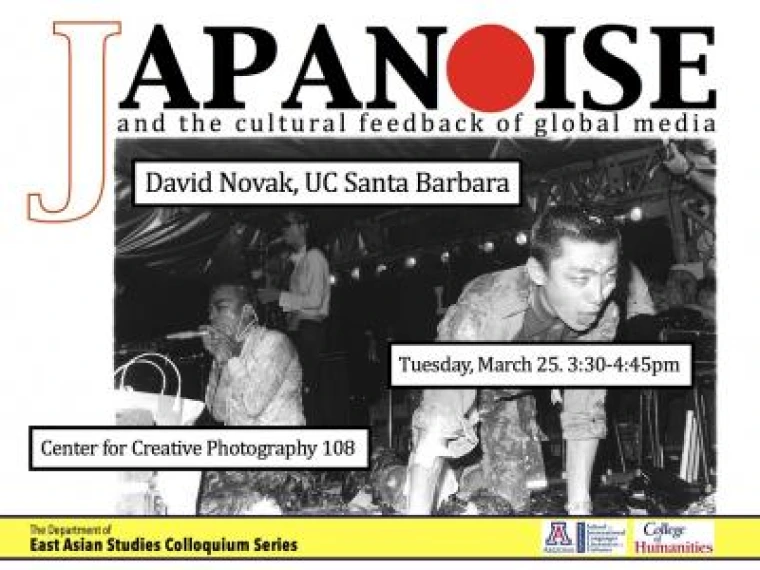The Department of East Asian Studies is excited to welcome David Novak (Music, UCSB; http://www.music.ucsb.edu/people/academic/david-novak) to Tucson on Tuesday, March 25 for the third installment of our spring colloquium series: "Japanoise and the Cultural Feedback of Global Media." The talk will take place at 3:30pm at the Center for Creative Photography. Dr. Novak's theoretically rich interdisciplinary work in ethnomusicology and anthropology has been featured in journals such as Public Culture, Cultural Anthropology, and Popular Music and is most recently represented by his book Japanoise: Music at the Edge of Circulation (Duke, 2013)(http://www.japanoise.com; introduction available here: http://www.scribd.com/doc/136527063/Japanoise-by-David-Novak). He is the co-founder of the Music and Sound Interest Group in the American Anthropological Association, and has actively pursued research on world music, urban acoustemology, and music within anti-nuclear protest movements in post-3.11 Japan.
-----------------------------------------------------------------------------------------------------
David Novak: "Japanoise and the Cultural Feedback of Global Media"
Tuesday, March 25. 3:30 to 4:45pm,
Center for Creative Photography, room 108
What connects distant listeners to far-off worlds of sound? In this talk, I will consider some of the methodological and theoretical possibilities (and limits) of an ethnography of circulation, based in my longterm research on an underground electronic music alternately called "Noise," "Noise Music," and "Japanoise." Noise first emerged in the 1980s, circulating on cassette tapes traded between fans in Japan, Europe and North America. With its cultivated obscurity, ear-shattering sound, and over-the-top performances, Noise captured the imagination of a small but passionate transnational audience. As a musical form, Noise always seems to be new, and to emerge from somewhere else: in North America, it became "Japanoise." But does Noise really come from Japan? How did it become music, and then, a metaphor for the complexities of globalization and participatory media? Circulatory networks between the United States and Japan are grounded in the "cultural feedback" that develops in the overlaps and disconnections between separated groups of listeners and performers. In Noise, feedback is used by musicians to create sound, and by audiences to imagine and narrate the cultural reciprocity forged over decades of transnational exchange of Noise cassettes, CDs, vinyl, and digital files. But feedback is also part and parcel of a creative subjectivity that puts circulation at the core of cultural formations, rather than as a secondary and separated context of transmission. Despite its marginality, Japanoise reveals how discourses of musical globalization are continually reformed at the edge, through creative subjectivities of sound-making and performance, and in transcultural interpretations of popular media.
David Novak is Associate Professor of Music at the University of California, Santa Barbara. His work deals with the globalization of popular media, noise, protest culture, and social practices of listening. He is the author of recent essays in Public Culture, Cultural Anthropology, and The Wire, as well as the book Japanoise: Music at the Edge of Circulation (Duke 2013) and the forthcoming volume Keywords in Sound.


